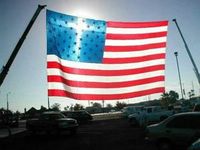Christians Fight Back
While the interpretation of the First Amendment differs greatly between conservatives and the far left, one thing is quite clear...Congress shall make no law prohibiting the free exercize of religion. While the far left like to focus on the establishment clause, and Conservative's like to focus on the free exercise Clause, there should be no argument when it comes to private property. As a matter of fact that is what this site is all about.... Encouraging people to practice their Constitutional rights to express their religion. So the following article should be good news to Conservatives and Christian liberals alike.
WHITLEY CITY, Ky. - It's one of the more conspicuous road signs on U.S. 27, a scenic route that meanders through the Daniel Boone National Forest on its way to a popular recreational area on Lake Cumberland.
"WARNING. Jesus is coming. RU Ready?"
Such proclamations, already common throughout the Bible Belt, could proliferate along roadsides in reaction to a Supreme Court ruling barring displays of the Ten Commandments in two southern Kentucky courthouses, said Don Swarthout, head of the Kentucky-based Christians Reviving America's Values.
"People want to do something to reflect their principles, and that's one way they can legally do it," Swarthout said.
While some groups continue the fight for the right to post biblical passages in public buildings, others are enjoying their constitutional privilege to post them where they're certain to be seen - in places of prominence on private property along roads and interstate highways.
Some are opting for professional displays on billboards. Others are using hand-scrawled signs on lawns or in cow pastures. Yet others are attaching bumper stickers to their cars. Swarthout said far more people will see the outdoor displays than would see a posting inside a courthouse.
Jimmie Greene, a retired McCreary County judge-executive, said he put a placard of the Ten Commandments on his lawn, as did most of his neighbors, after a judge first ruled that the display in the courthouse had to come down.
"You should have seen it," he said. "The landscape was covered with Ten Commandments."
Swarthout said the turmoil involving the posting of the Ten Commandments in public buildings triggered the reaction by private property owners to show their support for the cause.
"People feel like that is something they can do that shows they feel strongly about the principles of Christianity," Swarthout said.
The U.S. Supreme Court on Monday ruled that such exhibits on government property must be evaluated on a case-by-case basis to ensure they don't violate the Constitution. Its ruling said, however, that southeastern Kentucky's McCreary and Pulaski counties went too far and promoted a religious message when they put framed copies of the Ten Commandments on courthouse walls.
Officials first hung framed copies of the Ten Commandments in their courthouses in 1999 and later added other documents, such as the Magna Carta and Declaration of Independence, after such displays were challenged as religious by the American Civil Liberties Union.
At the height of the controversy, residents of the two counties began putting blue-and-white Ten Commandments markers on their front lawns to show their support.
David Friedman, who successfully argued the ACLU's case before the Supreme Court, said Monday's ruling reaffirmed a core principle - "that government and religion should not become impermissibly entangled."
Friedman said the ACLU would vigorously pursue cases against other local governments that have posted the Ten Commandments in public buildings.
Speaking to reporters at his downtown Louisville law office, Friedman said he welcomed people celebrating and displaying the commandments, just not on government property.
"They should do it in their homes, in their religious institutions, on their cars, in their businesses and not through their government," he said. "The government is all of ours, and it can only be all of ours when it remains neutral."
Churches, especially, have been making use of their marquees to do just that through what's called sentence sermons.
"We're kind of a sound bite society," said L. James Harvey, of Grand Rapids, Mich., author of three books of sentence sermons. "I'm trying to convince churches that they have a drive-by congregation, and they can reach out to them with these messages and sometimes change a life."
The messages aren't limited to church marquees. Harvey said Christian businessmen are incorporating them into outdoor advertising.
"I just think people have a thirst for truth wherever they can find it," he said. "When people are in their cars, they're kind of a captive audience."
Jim Ratliff, owner of Lighthouse Christian Bookstore near Pikeville, said he is seeing strong sales of ornamental license plates that allow people to share their messages with other motorists.
"Got Jesus?," one asks. "God Is My Co-Pilot," another proclaims.
"Those license plates make as many statements as you could possibly make," Ratliff said.
Others prefer bumper stickers. For pedestrians, it's T-shirts adorned with a list of the Ten Commandments or messages like "Smile, God Loves You."
"It's about freedom of speech," Swarthout said. "It's about sharing principles for people to live by."Source
WHITLEY CITY, Ky. - It's one of the more conspicuous road signs on U.S. 27, a scenic route that meanders through the Daniel Boone National Forest on its way to a popular recreational area on Lake Cumberland.
"WARNING. Jesus is coming. RU Ready?"
Such proclamations, already common throughout the Bible Belt, could proliferate along roadsides in reaction to a Supreme Court ruling barring displays of the Ten Commandments in two southern Kentucky courthouses, said Don Swarthout, head of the Kentucky-based Christians Reviving America's Values.
"People want to do something to reflect their principles, and that's one way they can legally do it," Swarthout said.
While some groups continue the fight for the right to post biblical passages in public buildings, others are enjoying their constitutional privilege to post them where they're certain to be seen - in places of prominence on private property along roads and interstate highways.
Some are opting for professional displays on billboards. Others are using hand-scrawled signs on lawns or in cow pastures. Yet others are attaching bumper stickers to their cars. Swarthout said far more people will see the outdoor displays than would see a posting inside a courthouse.
Jimmie Greene, a retired McCreary County judge-executive, said he put a placard of the Ten Commandments on his lawn, as did most of his neighbors, after a judge first ruled that the display in the courthouse had to come down.
"You should have seen it," he said. "The landscape was covered with Ten Commandments."
Swarthout said the turmoil involving the posting of the Ten Commandments in public buildings triggered the reaction by private property owners to show their support for the cause.
"People feel like that is something they can do that shows they feel strongly about the principles of Christianity," Swarthout said.
The U.S. Supreme Court on Monday ruled that such exhibits on government property must be evaluated on a case-by-case basis to ensure they don't violate the Constitution. Its ruling said, however, that southeastern Kentucky's McCreary and Pulaski counties went too far and promoted a religious message when they put framed copies of the Ten Commandments on courthouse walls.
Officials first hung framed copies of the Ten Commandments in their courthouses in 1999 and later added other documents, such as the Magna Carta and Declaration of Independence, after such displays were challenged as religious by the American Civil Liberties Union.
At the height of the controversy, residents of the two counties began putting blue-and-white Ten Commandments markers on their front lawns to show their support.
David Friedman, who successfully argued the ACLU's case before the Supreme Court, said Monday's ruling reaffirmed a core principle - "that government and religion should not become impermissibly entangled."
Friedman said the ACLU would vigorously pursue cases against other local governments that have posted the Ten Commandments in public buildings.
Speaking to reporters at his downtown Louisville law office, Friedman said he welcomed people celebrating and displaying the commandments, just not on government property.
"They should do it in their homes, in their religious institutions, on their cars, in their businesses and not through their government," he said. "The government is all of ours, and it can only be all of ours when it remains neutral."
Churches, especially, have been making use of their marquees to do just that through what's called sentence sermons.
"We're kind of a sound bite society," said L. James Harvey, of Grand Rapids, Mich., author of three books of sentence sermons. "I'm trying to convince churches that they have a drive-by congregation, and they can reach out to them with these messages and sometimes change a life."
The messages aren't limited to church marquees. Harvey said Christian businessmen are incorporating them into outdoor advertising.
"I just think people have a thirst for truth wherever they can find it," he said. "When people are in their cars, they're kind of a captive audience."
Jim Ratliff, owner of Lighthouse Christian Bookstore near Pikeville, said he is seeing strong sales of ornamental license plates that allow people to share their messages with other motorists.
"Got Jesus?," one asks. "God Is My Co-Pilot," another proclaims.
"Those license plates make as many statements as you could possibly make," Ratliff said.
Others prefer bumper stickers. For pedestrians, it's T-shirts adorned with a list of the Ten Commandments or messages like "Smile, God Loves You."
"It's about freedom of speech," Swarthout said. "It's about sharing principles for people to live by."Source






<< Home